 LG Electronics has rolled up its beefy sleeves, raised its fists and shouted, “Come oooonnn!!!! Let’s be ‘aving you!” to the electronics world, declaring its intent to more than double its share of the world’s top products by 2010.
LG Electronics has rolled up its beefy sleeves, raised its fists and shouted, “Come oooonnn!!!! Let’s be ‘aving you!” to the electronics world, declaring its intent to more than double its share of the world’s top products by 2010.
LG vice president Chun Myung-wo gave his best Clint Eastwood squint and socked it to his competitors, “Currently, we have five of the world’s top products. We plan to increase that number to a double-digit figure by 2010 through continuous efforts and innovation.”
 With a direct hit on the spittoon, he continued, “By substantially increasing the number of flagship goods through our technological prowess, we aim to evolve into a bona fide powerhouse.’
With a direct hit on the spittoon, he continued, “By substantially increasing the number of flagship goods through our technological prowess, we aim to evolve into a bona fide powerhouse.’
The electronics sharp-shooter currently hogs the highest global market share of items such as domestic aircon units, optical storage, home theatres, DVD players and code division multiple access (CDMA) handsets, but it wants more. Much more.
 Pointing aggressively, Myung-wo says he wants the global market for plasma display panel (PDP) modules, PDP TVs, liquid crystal display (LCD) TVs, side-by-side refrigerators, built-in air conditioners and drum washers to be pwned by LG.
Pointing aggressively, Myung-wo says he wants the global market for plasma display panel (PDP) modules, PDP TVs, liquid crystal display (LCD) TVs, side-by-side refrigerators, built-in air conditioners and drum washers to be pwned by LG.
Rags to riches
The Korean company has seen a remarkable turnaround of its fortunes over the last decade.
Ten years ago, LG was nothing more than a big fish in a small domestic market, managing only a limited global presence.
A policy of rapid expansion and smarty-pants innovation resulted in LG grabbing the numero uno slot for optical storage in 1998, a position it continues to hold.
 Similarly, when it comes to domestic air conditioners, LG rules the roost, and the company is now wrestling for the crown of King of Flat-Panel Displays, knocking out 730,000 plasma units last year to nudge past market leaders Samsung SDI.
Similarly, when it comes to domestic air conditioners, LG rules the roost, and the company is now wrestling for the crown of King of Flat-Panel Displays, knocking out 730,000 plasma units last year to nudge past market leaders Samsung SDI.
“We think that our technical edge will help us win out in the global competition in flat panel display and in other fields both locally and globally,” Chun said, pointing out that the company manufacture the world’s biggest TV set and the smallest one.
 We’re frequently impressed with the observations of Marc Freedman from
We’re frequently impressed with the observations of Marc Freedman from  As illustrated, average weekly sales during the first four-week periods of 2006 decline from 17.56 million units/week in the 1st period to 16.68 million units/week in the 4th period (a drop of .9 million units or 5.1%). Compare this to average weekly sales for the first four-week periods of 2005 when average weekly sales grew from 7.38 million units/week in the 1st period to 8.73 million units/week in the 4th period (an increase of 1.4 million units or 18.3%).
As illustrated, average weekly sales during the first four-week periods of 2006 decline from 17.56 million units/week in the 1st period to 16.68 million units/week in the 4th period (a drop of .9 million units or 5.1%). Compare this to average weekly sales for the first four-week periods of 2005 when average weekly sales grew from 7.38 million units/week in the 1st period to 8.73 million units/week in the 4th period (an increase of 1.4 million units or 18.3%). Digital music sales rose to a point where they essentially offset the decline in CD sales in 2005. (Bainwol was right on that point, but that was for last year.) With the hypergrowth behind it, digital music sales can no longer make up for the hemorrhaging of physical music sales nor will it return the music industry to its prior glory days.
Digital music sales rose to a point where they essentially offset the decline in CD sales in 2005. (Bainwol was right on that point, but that was for last year.) With the hypergrowth behind it, digital music sales can no longer make up for the hemorrhaging of physical music sales nor will it return the music industry to its prior glory days. Unlike the transition from albums to CDs or video tapes to DVD, ‘going digital’ is not a simple format media transition. The use of digital technologies and the Internet has and will continue to fundamentally change how entertainment is created, stored, distributed, and consumed. Technology has undermined the entertainment industry’s pretense of control despite its best efforts.
Unlike the transition from albums to CDs or video tapes to DVD, ‘going digital’ is not a simple format media transition. The use of digital technologies and the Internet has and will continue to fundamentally change how entertainment is created, stored, distributed, and consumed. Technology has undermined the entertainment industry’s pretense of control despite its best efforts. Think carefully the next time you edit your Flickr or Myspace profile.
Think carefully the next time you edit your Flickr or Myspace profile.  In September 2005 the European Commission adopted a proposal that would see telecommunications data held for one year and Internet data for six months and, last month, the European Court annulled the agreement which compelled airlines to submit private data on passengers flying to the US.
In September 2005 the European Commission adopted a proposal that would see telecommunications data held for one year and Internet data for six months and, last month, the European Court annulled the agreement which compelled airlines to submit private data on passengers flying to the US. Saturday saw anti-DRM protests at eight Apple stores across the USA organised by DefectiveByDesign, who are running an on-going ‘Campaign to Eliminate DRM.’
Saturday saw anti-DRM protests at eight Apple stores across the USA organised by DefectiveByDesign, who are running an on-going ‘Campaign to Eliminate DRM.’ List of Apple stores affected
List of Apple stores affected There’s mutterings of some discontent around MySpace, the insanely popular social site.
There’s mutterings of some discontent around MySpace, the insanely popular social site.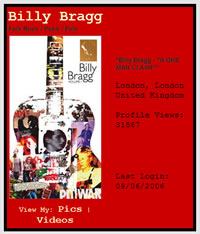 The original Bragg posting was made back in mid-may, but was highlighted when it was picked up by the
The original Bragg posting was made back in mid-may, but was highlighted when it was picked up by the 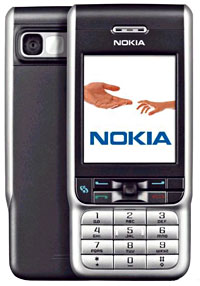 Sad but (supposedly) true: a new study by Nokia has found that over one in five mobile owners said they’d find losing their phone more upsetting than their wallet, credit cards and – unbelievably – even their wedding ring.
Sad but (supposedly) true: a new study by Nokia has found that over one in five mobile owners said they’d find losing their phone more upsetting than their wallet, credit cards and – unbelievably – even their wedding ring.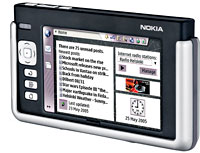 Nokia commissioned the research in 11 countries around the globe to discover people’s attitudes towards current and future mobiles, and generally found that people *heart* the things the planet over.
Nokia commissioned the research in 11 countries around the globe to discover people’s attitudes towards current and future mobiles, and generally found that people *heart* the things the planet over. Surfing on the move
Surfing on the move New research from messaging security specialists Proofpoint has revealed that more than a third of blue-chip companies in both the US and UK hire dedicated staff to snoop on their employee’s emails.
New research from messaging security specialists Proofpoint has revealed that more than a third of blue-chip companies in both the US and UK hire dedicated staff to snoop on their employee’s emails.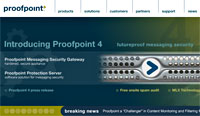 With companies becoming more concerned about internal security breaches rather than external threats, 34 per cent of companies claimed that their business was impacted by the exposure of sensitive or embarrassing information over the last year.
With companies becoming more concerned about internal security breaches rather than external threats, 34 per cent of companies claimed that their business was impacted by the exposure of sensitive or embarrassing information over the last year.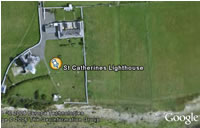 Google Earth/Maps
Google Earth/Maps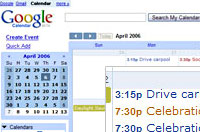 It’s uncertain how much information they do store, but it could be quite considerable. They actually might not know it’s you personally, but your computer. Google uses cookies which are used to track your personalisation settings, but they can store a lot more info, though Google are likely to just use the cookie as the identifier which enables them to quickly personalise things.Just looking at the information they could store when you do a search, it’s the search criteria itself, then which sites you clicked through to. But that can be combined with other info like what Google Map info you looked at, who you emailed through Google Mail and your previous search history. That may lead to a bleak picture if you’re committing illegal acts.The other side to it all is that the processing of all this information is extremely resource hungry and though Google are particularly good at correlating information, they might not bother. They will for some aspects, but most of the time it’s probably not worth it and they’ll keep succinct summarized information.If the authorities want to know what your doing, it’s actually much easier for them to go to your ISP and request the information from them (if they are running caching equipment which speeds up Web access for all users, they don’t just know what searches you’ve been doing, but every Website you’ve accessed and everything you’ve down or uploaded).The Future
It’s uncertain how much information they do store, but it could be quite considerable. They actually might not know it’s you personally, but your computer. Google uses cookies which are used to track your personalisation settings, but they can store a lot more info, though Google are likely to just use the cookie as the identifier which enables them to quickly personalise things.Just looking at the information they could store when you do a search, it’s the search criteria itself, then which sites you clicked through to. But that can be combined with other info like what Google Map info you looked at, who you emailed through Google Mail and your previous search history. That may lead to a bleak picture if you’re committing illegal acts.The other side to it all is that the processing of all this information is extremely resource hungry and though Google are particularly good at correlating information, they might not bother. They will for some aspects, but most of the time it’s probably not worth it and they’ll keep succinct summarized information.If the authorities want to know what your doing, it’s actually much easier for them to go to your ISP and request the information from them (if they are running caching equipment which speeds up Web access for all users, they don’t just know what searches you’ve been doing, but every Website you’ve accessed and everything you’ve down or uploaded).The Future  “Would you like a single piece of sheet music that contains all your favourite pieces, and never needs to be turned over?”
“Would you like a single piece of sheet music that contains all your favourite pieces, and never needs to be turned over?” The universal piece of music wasn’t even the first prize winner in this competition. It was a contest sponsored by one of the world’s leading e-paper technology designers, Plastic Logic, which has demonstrated a flexible sheet of A5 “paper” that has the contrast and readability of real paper, the flexibility of soft cardboard, and the power consumption of a watch. And the prize went to something that is, in the end, “just a book.”
The universal piece of music wasn’t even the first prize winner in this competition. It was a contest sponsored by one of the world’s leading e-paper technology designers, Plastic Logic, which has demonstrated a flexible sheet of A5 “paper” that has the contrast and readability of real paper, the flexibility of soft cardboard, and the power consumption of a watch. And the prize went to something that is, in the end, “just a book.” When you invent a new technology, you always start off by producing something which you know has a market already, and which you think you can do better.
When you invent a new technology, you always start off by producing something which you know has a market already, and which you think you can do better.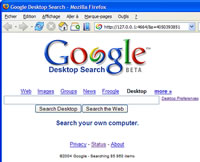 Google, a name synonymous with Internet searching, is now permeating the desktop. Currently it’s the PC (i.e. Windows environment) they’re moving into, but Apple Macs and even Linux are the likely next moves.
Google, a name synonymous with Internet searching, is now permeating the desktop. Currently it’s the PC (i.e. Windows environment) they’re moving into, but Apple Macs and even Linux are the likely next moves.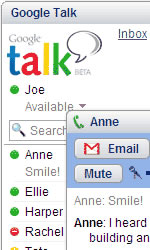 Google Talk
Google Talk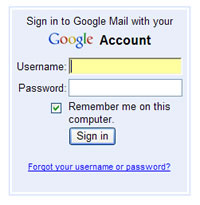 Google Mail
Google Mail